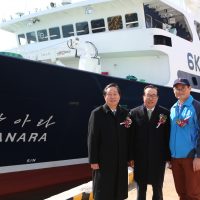
Dongwon Enterprise chairman Jae-chul Kim, a legend in the tuna sector, directly controlled US subsidiary and tuna brand Starkist Co during the years of the alleged price-fixing conspiracy, a new wave of class-action lawsuits against the big players in the sector claim.
Two lawsuits filed on Aug. 29 by retailers Moran Foods and Dollar General Corporation and a third filed on August 30 from Krasdale Foods are the latest to make allegations that the involvement in a price fixing conspiracy went right to the top at the South Korean firm, which owns US-based Starkist via its Dongwon Industries operation.
As well as Dongwon and its US operation, the former Starkist owner Del Monte Corporation, Thai Union Group and its US subsidiary Tri-Union Seafoods, which sells under the Chicken of the Sea brand, and Bumble Bee Foods are all included as defendants, as with most of the other class-action lawsuits.
All the lawsuits emanate from a separate US Department of Justice (DOJ) probe of alleged price fixing in the sector, which in turn seemingly stemmed from information revealed during a DOJ review of Thai Union’s attempted deal for Bumble Bee.
The deal collapsed at the end of 2015, with the DOJ stating the market was not “functioning competitively”.
The allegedly hierarchical structure of Dongwon under Kim, who started out as a captain on a tuna seiner and built the group from scratch, is a particular focus of the new lawsuits.
“Dongwon, run by Chairman Kim, is the parent entity for Starkist, but his control over the Dongwon family of companies was such that, with the stroke of a pen, he could (and in fact did) command executives of the holding company or from sister subsidiary companies to either oversee the business of Starkist from Korea or relocate in the United States and help run Starkist,” claim the lawsuits.
“This was done without regard for which Dongwon subsidiary the individual worked for, and for the purposes of involvement in Starkist’s management, all Dongwon personnel were functionally Dongwon Industries personnel subject to the direct control of Chairman Kim,” the lawsuits state.
According to the lawsuits, Dongwon is a “chaebol”, a term for closely-knit business groups in South Korea under the control of a single family or extended family, with key flagship firms that are used as the instruments of control of other firms within the group.
“In other words, as a chaebol, Dongwon does not follow the principles of corporate separateness that are expected of companies incorporated in the United States and instead acts as a single integrated enterprise,” the documents claim.
Acts taken by employees of Dongwon’s corporate affiliates, in furtherance of the alleged conspiracy “were taken on behalf of the interests of the chaebol and under the control of Dongwon (and Chairman Kim) as the chaebol’s flagship”, it is claimed.
Dongwon “directly participated” in the claimed conspiracy and “purposefully directed” this alleged conduct in the US from Starkist, the lawsuits claim.
The company “intentionally sold price-fixed canned tuna” to plaintiffs and others in the US and “used its dominance or control of Starkist’s raw material purchasing and tuna business” to conspire with the other defendants.
The claims first surfaced in May 3 lawsuits from Super Store Industries and SuperValu, then featured again in Target’s July 3 filing.
As well as claiming Starkist was run by Dongwon executives, the lawsuits also point out the close involvement of JC Kim’s son, Nam-Jung Kim (NJ Kim), in the company, during the time of the alleged conspiracy.
NJ Kim served as the chief operating officer (COO) of Starkist from about 2012 until October 2014, when he was promoted to vice chairman of Starkist. He currently serves on the board of directors for Starkist and Dongwon, the lawsuits claim.
According to Forbes, in preparation for chairman Kim’s succession, “the founder has been transferring ownership of the private family holding company, Dongwon Enterprise Co., which owns stakes in [Dongwon and other affiliates], to Nam-Jung. Jae-Chul holds a 24.5% stake and Nam-Jung, 68%”.
So, NJ Kim owned a controlling interest in Dongwon while serving as Starkist’s COO and vice chairman, it is claimed. “The position of COO was created specifically for him so that he could lead the “continued growth and expansion of Dongwon-Starkist’s global business.”
Also, the lawsuits claim Thai Union, in which the Chansiri family is the main shareholder, “participated in the conspiracy by and through COSI [Chicken of the Sea], which acted as and was Thai Union’s alter ego or agent”.
“During this time period, Thai Union effectively controlled and took over performance of the day-to-day operations of COSI’s canned tuna business, and there was such unity of interest and ownership between Thai Union and COSI that the individuality or separateness of the two companies ceased with respect to COSI’s canned tuna business,” it is claimed.
The DOJ case against the tuna companies, which has caused the wave of class action lawsuits from buyers, likely stems from a whistleblower, it has been claimed.
Earlier in August, Undercurrent News reported that the guilty pleas from executives with Starkist and Bumble Bee, as well as the latter company itself, support legal claims made that Thai Union-owned Chicken of the Sea is the whistleblower in question.
Starkist is also embroiled in another lawsuit in the US, over an alleged trademark infringement, court records show.
Cambridge, Massachusetts-based Purse Seine Holdings, which since 2010 has owned the trademark to the Bela brand of packaged seafood products, filed a June 27 lawsuit against Starkist in Massachusetts federal court.
Purse Seine claims that Starkist’s brand, Bella Portofino, which features Italian imagery but is canned at the company’s American Samoa facility using tuna from the South Pacific Ocean, violates unfair competition laws by using a “confusingly similar” mark.




